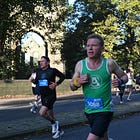The Social Business, #63
An invitation to join me for a climate conversation, some podcast recommendations, and the best thing I've ever seen on TV.
One of the positive things about leaving a job and exploring what to do next is that it gives you time to check that what you’ve been doing is really what you want to be doing.
I’ve always been very purpose-driven, and I’ve prioritised doing work where I feel that I can make a genuine difference.
Since 2018, I’ve focused primarily on themes around the climate crisis, the circular economy, and broader environmental issues. And whilst I know I’ve done good work in that time, I’ve increasingly found myself questioning my approach to working with people.
This is a really nuanced issue that I can’t do justice to in a short newsletter, but I think it’s fair to say that given the gravity of the situation we find ourselves in, our societal response to the climate crisis is woefully inadequate.
And, as hard as so many of us are working to engage more people in facing up to and responding to the problem, it’s so very clearly nowhere near enough.
At the same time, I’m very sensitive to people having a go at climate campaigners, advocates, protestors, educators etc - as I think much of that criticism is unfair. Lots of us are doing a lot of good work, much of which is under-resourced, and the context we’re doing that in is increasingly hostile.
Prime responsibility for the situation we find ourselves in lies with politicians, big businesses and all the vested interests that are currently leading us towards societal collapse.
But within that really challenging context, I find myself increasingly questioning how I - and others - can more effectively work with more people so as to build the kind of momentum that gives us a fighting chance of a liveable medium-term future.
And guess what, I’m at the stage of having more questions than answers on that one.
But I’m finding the time between jobs to be a really valuable time to take a step back and listen to more perspectives on how best to work alongside people to explore such a difficult, multi-layered problem.
Earlier this week I enjoyed this podcast from Oasis Human Relations, who I came across because I’m currently thinking of joining their next coaching course.
There’s so much that resonated with me in this conversation - particularly around how a coaching approach can be valuable when exploring such a difficult issue as the climate crisis. It chimes with perspectives I’ve explored here before, from people such as psychologist
.I also enjoyed their conversation about strategies for dealing with feelings of overwhelm - which just about anyone who’s engaging with the climate crisis will experience on a regular basis.
The concept of developing “agency” is one that’s explored a lot in relation to how to deal with climate anxiety - and I liked how they built on this in this episode by exploring the idea of “finding what is mine to do”.
When it comes to climate issues, it can be easy to feel that you’re never doing enough, when there’s so much to do. But “finding what is mine to do” - things that you’re good at, feel drawn to, bring you joy, align with your purpose etc…. is far more likely to be what the world needs, rather than trying to do everything, and burning out.
And yes, that’s a message to myself as much as to anyone else.
I’m currently #OpenToWork
Since my last newsletter, I’ve spent a fair bit of time applying for jobs - which as many of you will know, is a very fun pastime.
I’ve found myself, in my early fifties, applying for jobs for pretty much the first time in my life, as most of my working life has been a mix of self-employment, setting up social enterprises which I’ve then run, or ending up in a paid job after starting out as a volunteer.
My varied “career path” has been rewarding in so many ways and helped me to develop a broad range of skills and gather all sorts of experience, but it appears that kind of backstory is not always valued by organisations that often prioritise quite narrow specialisms, more conventional career paths, or very specific qualifications or experience.
I’m not totally convinced that this kind of approach to work is serving us that well, particularly when it comes to tackling complex, multi-layered social problems. But then I suppose I would say that wouldn’t I?
Anyway, I’m sure something will come, as it did a couple of years ago when I left the social enterprise I’d set up 12 years previously.
And whilst searching for jobs, I’m also looking to build up my freelance work. You can find out more about that on my website. There’s more below as well about a piece of work I’m doing with community sports clubs in West Yorkshire.
Let’s talk
On the theme of coaching and taking a more person-centred approach to working with people, I’m currently exploring how to have better, more helpful conversations on topics such as the climate crisis.
I’m not a qualified coach - but the approach I’ve taken to working with people over the last twenty years - whether on climate issues or more broadly around social enterprise and social innovation - is very much in line with a coaching approach.
Listening deeply, asking questions, not pretending to have answers, being alongside people as they find their own ways forward. Instinctively I know this is helpful to a lot of people.
To help me to explore this more - and to hopefully be of help to a few other people too - I’m offering three 90 minute “climate conversations” to three of my newsletter subscribers.
There’ll be no agenda - I’ll be led by you and we’ll see where the conversation goes.
But to give you an idea, it may be that you may want to explore the mixed emotions you feel when thinking about this topic - or you might decide you want a bit of help getting your head around something you’ve never quite understood about why the planet is heating up.
Or perhaps you’re exploring all of this in a work context, and it’s increasingly hard work. And maybe you’d like to talk it through, with no promise of any answers, other than perhaps the ones you’ll come up with yourself as we talk.
I’m offering the sessions either online, or, as a bit of an experiment (for those of you in or near Leeds) outdoors - either a walk or a sit down on a bench in the park.
I’m convinced that there’s something about walking - and being outdoors - that helps us to move on with whatever it is we’re facing - particularly when we’re talking about our impact on the world around us.
This is an opportunity just for newsletter subscribers - so if you’re interested, please fill in this short online form by 31st May. Or get in touch with any questions.
Free support for community sports clubs in West Yorkshire
The main thing I’m working on at the moment is the Sport For Good project, a project funded by West Yorkshire Combined Authority to provide a range of support to local community sports clubs.
I’m working alongside Voluntary Action Leeds to provide support to five local clubs, to help them to come up with their first Environmental Action Plan. The support will be offered on a one-to-one basis, in three online meetings - and will take up around 5-6 hours of someone’s time.
The aim is to gain an understanding of the main environmental impacts of the club’s activities - and then to explore practical ways to reduce those impacts - whilst continuing to bring lots of social and financial benefits to the club and its members.
To find out more either contact me or book in for an online meeting.
Other things I’ve enjoyed this month
Alongside the podcast I mentioned above, I’ve enjoyed a couple more of the Oasis podcasts - including this one on Deep Ecology and this one with Anna Jacques on neurodiversity in coaching.
I also recently discovered the Communicating Climate Change podcast - and particularly this episode on Climate Communication and The Brain with Kris De Meyer from UCL’s Climate Action Unit, and Charting A New Course With Rupert Read.
The concept of “thrutopia” - explored in the conversation with Rupert is a new one to me - and reminded me of the Hope In A Time Of Collapse conversation that I linked to above.
And whilst I don’t spend all my free time watching TV series about climate change or any other apocalyptic imaginations of the future, (this month I’ve mostly been enjoying watching Liverpool win the league if I’m honest), I’m enjoying the Danish drama Families Like Ours, which is available on BBC iplayer. What happens next when sea levels continue to rise, and economies begin to collapse? Hardly light entertainment, but important and good to watch all the same.
And finally….
I think The Assembly - where a collective of autistic, neurodivergent &/or learning-disabled interviewers grill a celebrity - with no question out of bounds - is just about the best thing I’ve ever seen on TV.
I never thought it could get any better than the original episode with Michael Sheen, but then last week Little Mix’s Jade Thirlwall turned up. Beautiful, life affirming TV.








